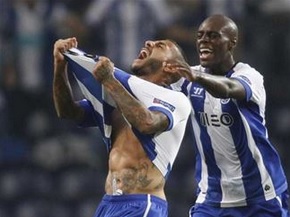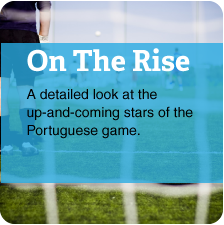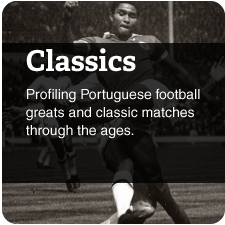How have Benfica, Porto and Sporting performed?
Matchday Three saw Sporting lose 4-3 in an incredible match in Germany against Schalke 04, while FC Porto continue to sit pretty at the top of Group H following a 2-1 win over Athletic Bilbao, substitute Ricardo Quaresma (pictured) scoring the winner. Benfica played out a goalless draw at Monaco on Wednesday night.
PortuGOAL runs the rule over how the Portuguese trio have performed so far and what their prospects are for the rest of the tournament.
We also look at the major tactical issues facing each of Portugal's three main teams at this stage of the season.
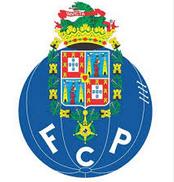 FC Porto expert Simon de Sousa
FC Porto expert Simon de Sousa
1) How would you appraise Porto's performance overall in this season's Champions League so far?
Barring some individual errors which could have led to different results, FC Porto are deserved leaders in Group H. Winning matches at home is key in the Champions League - and Porto has done just that.
An away draw to the current group runner's up (Shakhtar) has to be seen as a positive result. Julen Lopetegui has shown no fear of fielding young, inexperienced line-ups in these matches.
2) What have been the major positives and what have been the disappointments?
The major positive for Porto this season is the resurgence of striker Jackson Martínez. After a lacklustre 2013, the Colombian seems to have found his identity and goalscoring touch again - paving the path for several victories thus far. While Jackson had an off night against Athletic Club, it was his late brace as a substitute in Lviv which stole Porto a point against Shakhtar. A new supporting cast of Yacine Brahimi and Óliver Torres always seem to treat the Porto faithful at the Dragão to quality football. And does 17-year-old Rúben Neves still need an introduction?
Disappointments have come in the form of uncharacteristic, sloppy passing errors. Porto seem to struggle to get through a full 90 minutes without a poor pass or two or three in the defensive third which is turned into a goal or scoring opportunity for the opposition.
3) Will the team qualify for the knockouts?
Likely, but nothing is a guarantee in the Champions League. Should Porto pick up three points at San Mamés, qualification looks very likely, probably as group winners.
Talking tactics, with Vasco Mota Pereira
As far as the Dragons are concerned, the celebratory mood that had been filling the air in the vicinity of the Dragão for the initial weeks of the season seems to be on the wane. Poor results, coupled with less than stellar performances and the supporters' difficulty to grasp the coach's pinch for squad rotation, have increased the pressure upon recent incumbent Julen Lopetegui.
At the moment, there seem to be two pressing issues when it comes to FC Porto – and both have to do with the team's specific brand of football – the Spanish-inspired tiki-taka, if you will. The first problem is clearly the lack of organisation in the defensive phase. In shorter, simpler words, this means that FC Porto look most vulnerable from the moment they give the ball away.
One of tiki-taka's main precepts is that, if that style is to be ultimately successful, the team has to react incredibly fast and efficiently to the moment the ball is lost, which has hardly been the case with FC Porto this season. Because the ball is not recovered within seconds, Lopetegui's side often looks unbalanced and, if the opposition manages to break past the first line of pressure, there is always acres of space to attack into. This is something that needs to be addressed as quickly as possible if FC Porto still harbour any chances of domestic or European success.
The second issue is tied to the other side of the game: the attacking phase. One of the risks of this possession-based approach is the mechanisation of movement and passing patterns, and that seems to be more and more true as far as FC Porto are concerned. The offensive strategy seems to lie solely on quickly switching the side of play so that the talented attackers that usually occupy the wings can face 1v1 situations and serve Jackson Martínez, turning the centre of the pitch into a barren area of the pitch, seemingly unsuited to use to create danger. By now, opponents have picked up on that tendency and have taken measures to stifle that threat, simultaneously allowing the Dragons time on the ball and waiting for them to be caught in possession – an increasingly frequent outcome.
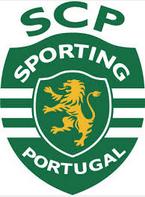 Sporting expert Richard Cole
Sporting expert Richard Cole
1) How would you appraise Sporting's performance overall in this season's Champions League so far?
Not nearly as bad as our one point would lead people to believe. A last minute howler against Maribor and an incredibly unlucky defeat of 10 versus 12 against Schalke really distorts how the team has played so far.
Certainly the team that was fairly average against Maribor has improved with more to come, I'm sure.
2) What have been the major positives and what have been the disappointments?
The major positives have been individual performances from the likes of Nani, Adrien Silva and Rui Patrício. The gutsy second half display against Chelsea and the even more gutsy fight-back against Schalke with just 10 men also show that Marco Silva has given this Sporting side an excellent spirit.
Disappointments have come through individual errors. Maurício seems lost without Marcos Rojo there to support him and Naby Sarr also looks capable of errors.
3) Will the team qualify for the knockouts?
It's not impossible and wins over Schalke and Maribor at home would leave Sporting finishing with 8 points should they lose to Chelsea. Yet this has been an odd group and I think even a 3rd place finish would be acceptable should it lead to a possible challenge for the Europa League.
Talking tactics, with Vasco Mota Pereira
Despite their better-looking domestic form, Sporting currently lie in fourth place of their group. Even though we won't be going into painstaking detail about the reasons why, it is hard not to focus on the centre-backs.
Anyone who is dedicated to running, cycling or any similar activity will know about the importance of having a strong core. While Marco Silva has done extremely well in managing to strike a balance between a defensively organised team and a side who knows when and how to pounce on the opposition, the centre-backs at the core of his defence look weak. The pairing of Maurício and Sarr looks vulnerable against mobile attacking opposition and ominous whenever they are required to bring the ball forward, which could leave Sporting quite exposed with limited attacking options. It is hard to envision the Lions progressing with such a glaring handicap in one of the most important areas of the pitch.
On the other hand, however, there's Nani. Even though most people were acutely aware of the winger's potential, witnessing him not make the most of it was enough to wonder how he would face his return to the Alvalade. Not only has his attitude been irreprehensible (Ryan Gauld's words of wanting to follow his example prove exactly that), but his positioning – and resulting contribution – also merits a few words.
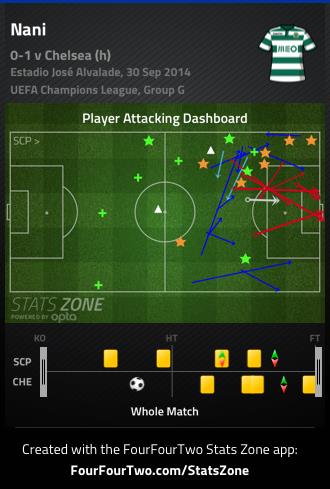
Sticking to one of football's unspoken rules that dictate one should put the best player in the centre, whatever his original position may be, Marco Silva seems to have stumbled upon a winning recipe by allowing Nani to roam from the left to the centre and act as a hub for his team's play. The fact that he can nutmeg virtually any opponent, shoot, cross or assist – and with both feet, no less – consequently provides an immediate threat to Sporting's oppositions, but the need to close him down also opens up space to his team-mates, whom Nani has been happy to provide for.
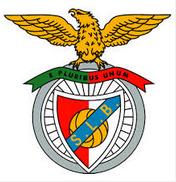 Benfica expert Marco Lopes
Benfica expert Marco Lopes
1) How would you appraise Benfica's performance overall in this season's Champions League so far?
Unlike past years, where the group draw has – ironically – been relatively kind despite Benfica’s underwhelming results in the competition, this draw was very tough. Zenit are a well assembled team with quality (as Benfiquistas would recognise given the presence of Witsel, Javi Garcia and Garay, amongst others); Monaco may be without Falcao and James Rodríguez but are hardly are a poorly balanced side; Leverkusen are a much improved team under new coach Roger Schmidt even if the Bundesliga table doesn’t reflect this. All in all, a very tough group for a talent-depleted Benfica to navigate.
It sounds an obvious statement, but the reality is that the opening result at the Luz against Zenit was just about the worst way to start the campaign. The goals were cheaply conceded to open spaces and it’s no coincidence that Eliseu and Jardel were largely off the pace, given that they are two of the new first team players that the Eagles were forced to bring in. They were expensive points to drop at home.
Leverkusen were predictably excellent at home and their intense, highly coordinated high pressing game asked too much of a sluggish Benfica, especially in building meaningful attacks from the back.
The performance against Monaco was much improved and to a fair extent unlucky, but the Champions League is ruthless for small margins of error, and a win would have made a big difference. It’s not been a good campaign.
2) What have been the major positives and what have been the disappointments?
It’s hard to pick out positives. Jorge Jesus has spoken very candidly of his priorities on the Liga, and this may be simply because the very first game against Zenit was so defining in the team’s fortunes in the campaign ahead. The exceptional start domestically has been once again undermined in the team’s European misadventures.
Having said that, while no-one enjoys defeat, Benfica still have two games left at the Luz. Their defeat in Germany wasn’t pleasant, but it’s the Champions League, after all. A tight group like this means that you’ll sometimes have to tolerate defeat away from home to difficult opponents.
The only major positive is that qualification is still possible by virtue of a decent result away to Monaco, though a win would obviously have been best. Individually, Salvio has looked great, and extremely troublesome, albeit in shades in the first two matchdays.
The disappointments are obvious. The goals conceded have felt soft, even if the build-up play for Leverkusen’s second was considerably difficult to defend. The attack seems extremely tentative, and Lima chose an unfortunate time to hit a poor block of form. Too few of the players seem to be bringing their domestic form into Europe.
3) Will the team qualify for the knockouts?
Mathematically, it’s possible, but it’s extremely hard to envisage. Leverkusen are worthy of a draw in Russia, but Zenit have back to back home games and wins in both would propel them to a very strong position. The Eagles need three points in every match, but the key games feel like the ones on Matchday 5.
If both the Russian and German sides win, they’ve effectively qualified. But assuming Benfica beat Monaco on Matchday 4, a win against Zenit brings the knockout stage within reach and makes the final game against Leverkusen a more meaningful must-win fixture for Jorge Jesus’ team to ensure that they have a chance of finishing second, or even first depending on the goals involved.
The problem that Jorge Jesus needs to solve, of course, is actually beating Zenit in Russia…
Talking tactics, with Vasco Mota Pereira
Under Jorge Jesus Benfica have steamrollered most of their domestic opposition with incredible ease. In fact, if we remove Vítor Pereira from the equation (including his time as André Villas-Boas' assistant coach), Jesus has dominated the past few seasons of the Portuguese league.
However, despite all the success in the Europa League, the Champions League has proved a different story and this season does not seem to be much different. As so often has been the case, Benfica's style of play has seemed ill-suited to the particular characteristics of Europe's top-tier competition.
The transition-based approach of quick breaks and reliance upon their defence's ability to fight against opposing attackers in evenly numbered fashion has led to difficulties against Zenit and Bayer Leverkusen. The transitions that Benfica tend to need to create opportunities for themselves leave them exposed to breakaways from more powerful and clinical teams. The picture below tells a story of a team that is consistently vulnerable down the middle, not unlike the previous seasons.
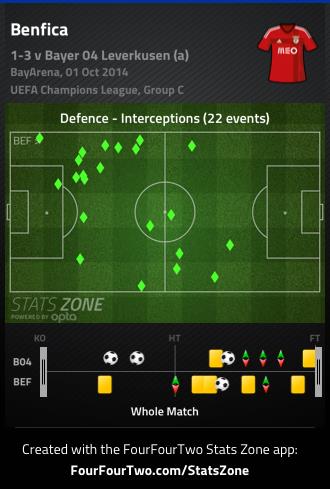
On the other hand, Ezequiel Garay's absence should not go unnoticed. The Argentinean centre-back was a crucial lynchpin to initiate Benfica's attacks from the back, ensuring there was always someone comfortable on the ball in the back-four. With Garay's departure, neither Luisão nor Jardel look particularly at ease carrying out that task, something that has become too obvious for anyone paying enough attention and often costly to Benfica's best interests.


